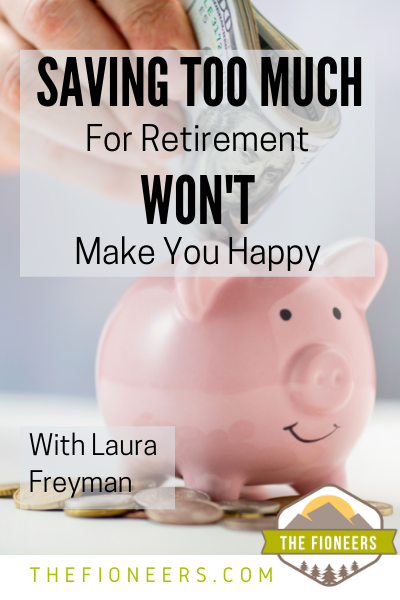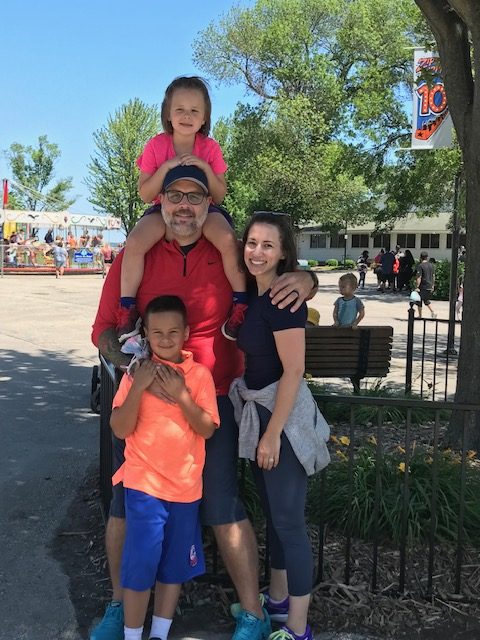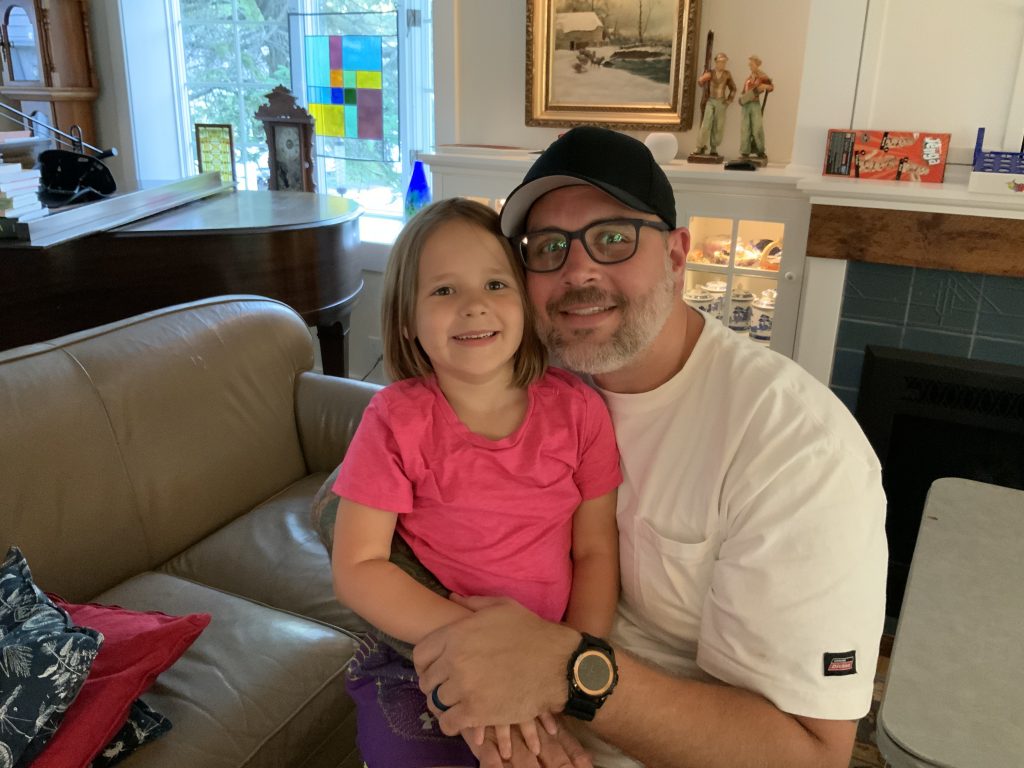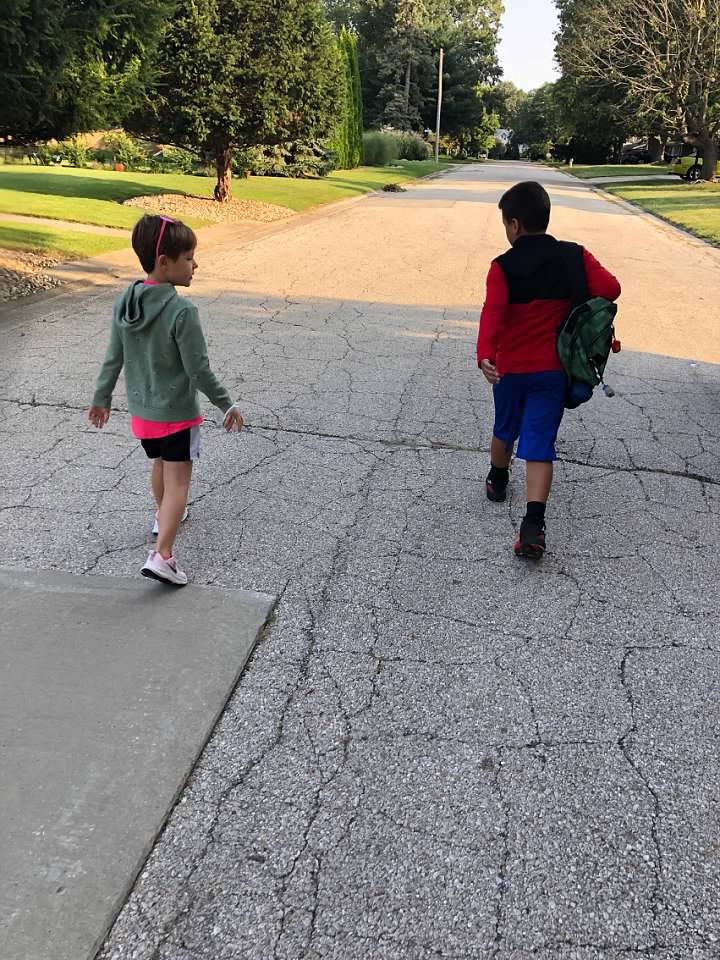
“FI and saving became something to hold onto as a cheap stand-in for happiness.” – Laura Freyman
Within the FIRE movement, people too often treat FI and saving as a cheap stand-in for happiness. People consistently think, “If I only get to the next milestone, then I will be happy.”
Unfortunately, we’ve seen enough examples to know that it doesn’t work this way. People who were miserable before they reached FIRE are often just as miserable after they reach it. They simply realize that they can no longer use time or money as an excuse.
Today, I’m bringing you a Slow FI interview with Laura about how her family decided to question this approach. Laura’s husband Mike was extremely burned out after working for a number of years in retail management. Being in a pandemic dramatically exacerbated it as well.
In 2021, he quit his stressful job, took a few months off to recover from burnout, and found a new job that was much less demanding. This change has had a dramatic positive impact on his life and his family.
Before giving away their full story in the introduction, let’s get into the interview.
1. Tell me a little bit about you.
My name is Laura. I’m 35 and my husband, Mike, is 42. We have two children, ages 7 and 5. We had very different upbringings, so we came into our marriage with very different views of money.

I grew up in a small town in Iowa. As a pastor’s kid, I watched my parents follow their calling while also knowing we had limited financial resources. As a result, I developed a scarcity mindset.
Mike grew up in the Chicago suburbs with seemingly unlimited resources. Mike’s mindset is exemplified by this statement: “I can always make more money tomorrow.”
We both started our careers with lower salaries and brought in $50-60,000 per year combined. After paying off my student loans, we started investing in earnest around my 29th birthday.
Since then, we’ve both made career shifts that have increased our income. Most of my career has been spent working in non-profit development. When I worked in non-profits, I worked 32 hours/week and spent time on my painting side hustle. Now, I work full-time at a university and am enrolled in an MBA program (that’s free for me!).
Mike spent the first 12 years of his career working with children with disabilities. Things changed in 2017 when the state made huge budget cuts. Mike’s job was eliminated, and he started working at a large retail giant. Little did we know that in just 3 short years, he would receive multiple promotions and be managing a team of 150 people!
What began as a stopgap quickly turned into a lucrative but physically and emotionally demanding job. By the time COVID hit in early 2020, we were succeeding financially, but it felt like our family was coming apart at the seams.
2. What deliberate decision have you made to slow down and improve your life?
Let’s talk about the why before we talk about the what.
By the late spring of 2020, Mike’s work became even more demanding. Supply chain issues exacerbated early pandemic fears. Retail managers bore the brunt of angry customers and less than safe working conditions. Mike was managing his own mental health while trying to promote a healthy environment for his team.
Although his company offered increases in income and paid time off for COVID, this was paired with increased productivity standards due to the increased demand. Managers were expected to do more with fewer employees. Pick-up orders surged to thousands in a day!
At the same time, my university job went remote, and I was working from home full-time with two children. We were exhausted, but we somehow made it work.
By December 2020, Mike was physically drained and emotionally spent. He had spent a full year leaving the house at 4:30 AM and returning after 6 PM. The holiday season brought on even more demands and angry customers. He came home quiet, sullen, exhausted, and unable to interact with us.
We knew something needed to change. We barely saw each other, and when we did, we were too tired to offer much more than a brief recap of our days. It felt like we were married to our jobs, not to each other.
In early 2021, we spent time weighing our options.
We were in the best place we’d ever been financially, but we began to ask ourselves, “What is all this money for?” We had all the money we could want, but we were miserable.
Even without knowing how everything would work out, we knew he needed to leave his job.
Mike liked the idea of someday returning to social work, but we knew he’d need time to rest and recuperate first without the pressure of finding another job.
We set our sights on May 1st and later dubbed his intentional break as the “Summer of Freedom.” We even added a line in our budget called the “Freyman Freedom Fund.” Between January and May, we added $15,000 to this fund which doubled our existing emergency fund.
This allowed Mike to leave his job on May 1st.
At the end of the “Summer of Freedom,” Mike was able to secure a job with the same nonprofit he left in 2017. The job is meaningful and a lot more flexible than working in retail. He now gets to be on the same school schedule as our kids. While this change came with a nearly $50,000 pay cut, it’s been worth it.
3. How did the decision for Mike to quit his stressful job impact your family’s quality of life?
To be honest, the transition wasn’t always easy. When you go from running full speed ahead to taking a break, it can dredge up serious physical and emotional pain.
Mike spent much of his summer going to physical therapy to heal his back and elbow from overwork. We later discovered that he has a degenerative disk disease that was exacerbated by all of the walking he did on concrete at work. He also started seeing a counselor.
As much as the summer was challenging, it provided him with time to heal.

When I asked him about this, Mike said, “My mental and physical health have improved. My overall willingness to interact with family and friends has increased. I feel less pressure. I’m not as fatigued. I actually want to be social! And, I’m more patient now, especially when I’m at home with family.”
For me, the best benefit has been that I feel as if I’ve gotten my husband back. We are now being intentional about weekly date nights, committed to setting (my) work aside to talk at night, and are in general more on the same page than ever.
One incredible bonus is that Mike is now on the same school schedule as our kids. He gets to pick them up after school and will have time off with them each summer. For the first time in years, we get to have winter break off together when my University closes. And, Thanksgiving will be a time to enjoy each other’s company, rather than a rush to work for Black Friday.

Finally, Mike recently re-enrolled in school to finish the bachelor’s degree he started many years ago, something he would not have had the time or energy for previously. His employer will reimburse us for half of his tuition. We’re both in school now and are excited about the chance to learn and grow together.
4. How did the decision to downshift impact your financial goals or timelines?
Our financial timeline has shifted, but so have our goals. Now, we are less focused on achieving early retirement as quickly.
When Mike left his position, we anticipated using the “Freyman Freedom Fund” in the short term to replace his income. We ended up needing to use less of the fund than expected.
After Mike quit, he received three extra paychecks for vacation and sick time payout. He started working again in August. In September, I received an unexpected raise, which helped to balance out the change in our family’s income.
We ended up being able to use the leftovers of our “freedom fund” to do some landscaping, enjoy a few family trips, and save toward a basement remodel.
It’s hard to compare our long-term goals from before and after the transition. When Mike was working in retail, I became hyper-focused on financial independence. FI and saving became something to hold onto as a cheap stand-in for happiness. We’d think, “As long as we hit our financial goals, what does it matter if we aren’t happy?”
Now, I feel lighter and less anxious about money. I now realize that all the money in the world didn’t matter if my family wasn’t healthy and, most importantly, able to be present together.
Contributing to our 403Bs will be optional in a few years from a savings standpoint, but we plan to continue to max out our Roth IRAs as long as we are working. Mike will be work-optional by 52, which is 10 years from now. I will likely continue working until age 52 (when Mike turns 59).
We now also don’t feel as strongly about paying off our mortgage early. We have a low mortgage interest rate, so we’re choosing to prioritize our investments right now.
5. What enabled your family to downshift?
There were a few things that enabled us to make this decision.
The first was our frugal lifestyle. Even though Mike took a $50,000 pay cut, we were able to make it work. We’ve lived in the same house since we got married ten years ago. We’ve always paid cash for our cars, and we never truly upgraded our lifestyle.
There were also many costs that we were able to easily cut once Mike quit his job, including:
- Gas costs from his commute
- Snacks and drinks at work to help him stay awake
- Convenience dining
Our daughter also just started Kindergarten this past fall, so our childcare expenses were also reduced significantly.
Mike also needed to work through the emotions of leaving his job. He shared, “I’ve never felt the need to be the provider; it’s always been about both of our jobs. I worried more about the fairness of you needing to work more and make more money and how that might impact our relationship.”
The fact that we combined our finances when we got married was very helpful when making this decision. We’ve worked hard to have an “our” mentality surrounding financial decisions. Now, I actually feel more aligned in our decisions than ever before, regardless of who brings in what.
Building up the “Freyman Freedom Fund” also provided Mike with the confidence he needed to quit. Mike shared, “Because we had a plan, it gave me permission to leave. I knew everything would be fine financially, even if I was still trying not to panic about my income being gone completely and then cutting it in half when I took the new job.”
6. What changes did you make so you could continue working toward your goals?
One interesting by-product of Mike’s career change is that he’s actually become more budget-conscious. And, I’ve become more comfortable spending money on things that really matter!
Mike shared, “Being more active in our budgeting helps me to be aware of what I’m spending instead of thinking, ‘Oh, I can always make more money.’ I’ve now realized I can still live the way I was living at half the salary by being more intentional and conscious of my spending.”
We’ve also started spending more on medical expenses and date nights. When I was obsessing over FI, I tried to minimize spending on everything, including these important things.
One thing that we’ve also done was to increase our individual spending cash. I was normally the one to run the budget (and get annoyed if we went over). Now that I make more money, it changes the power dynamic a bit. I definitely don’t want him to feel punished for making less since this was our collective choice (and I couldn’t do my job without him being more active at home). This is simply another reminder that our money is ours to spend as we please, not just mine or his.
7. How did your pursuit of FI help or hinder the decision to downshift?
Our pursuit of FI both helped and hindered our decision.
Let me start with how it helped. Because of our pursuit of FI, we’ve always lived below our means and had a long-term plan. Being in a good financial position allowed Mike to quit his stressful retail job, take time off, and choose to accept a lower-paying job when he went back to work.
Because we were pursuing FI, we’ve also long understood that our way of life is slightly counter-cultural. We’ve become accustomed to making choices that fit our lives, not the lives of our family, friends, or neighbors. We’ve intentionally quieted the naysayers and resisted being guilted into living in a way that is not authentic to us. FI gave us a mindset to feel like Mike’s decision to leave his job was most of the most authentic decisions our family could have made.
On the other hand, pursuing FI hindered the decision as well. It’s so easy to have an all-or-nothing mentality when it comes to pursuing FI. This mentality tells me that I’m either FI at 35 or destitute. I’m either saving 50% of my income, or my retirement is doomed.
I read two books over the past year that helped me get more comfortable with making an intentional decision to earn and save less.
The first book was Die with Zero. It helped me take a second look at our savings goals. Did we really need $5 million at age 70? Probably not! $5 million would give us the ability to spend $200,000 each year without ever running out of money. In our most extravagant spending year ever (which included full-time daycare, all new floors, and a kitchen remodel), we spent $86,000.
I realized that I didn’t want to over-save while my kids still wanted me around. I wanted to prioritize time together and family vacations during those fleeting years.
The second book, Your Money or Your Life, made me realize how much “life energy” I was exchanging for the false sense of security that over-saving provided me. In the book, the author posits that we “pay” our life energy to get money. Then, we use that money to pay for things. Ultimately, we are paying for things with our life energy.
This inspired me to think about a few questions:
- What did we truly need to be happy?
- How much money would we really need in retirement?
- How much is truly enough for us?
Being able to answer these questions allows me to trade just the right amount of my life energy for money.
I’ve also begun to challenge my assumption that I will feel or be different once I reach a specific financial milestone. I no longer think, “When I have $1 million in net worth, I’ll be happy.” Yes, a certain amount of income and financial security has made financial stress go way down, but anything above that threshold hasn’t improved our happiness significantly.
I know that I am speaking from an incredible place of privilege. Now, though, it feels better to spend and give intentionally rather than to continue obsessing over accumulation.
8. How do you plan to continue designing your life?
Mike and I are committed to our marriage, our children, cultivating a sense of community, and serving others.

We’re emphasizing our mental health through counseling, prioritizing alone time and time with friends, and doing the things that make us happy (gardening for me and building intense Lego sets for him).
Our family is also relearning to be fully present with each other in the stage where we are all at.
I am interested in slowing down too. Mike didn’t quit his job just for us to switch roles. Intentionally downshifting is both of our responsibilities.
I’m continuing to pursue my MBA because I enjoy the classes and love meeting other students. That said, I’m being intentional about setting work boundaries and accepting that not everything has to be perfect. I’m also looking at what I can outsource and delegate. I’m also choosing to remind myself that “my job existed before I knew about it, and it will survive long after I’m gone.”
9. Why and when do you think someone might consider “downshifting?”
Mike says this best: “When it becomes physically, emotionally, and mentally too much it’s time to downshift. By the end of 2020, I was burnt out. I wasn’t enjoying my job. I wasn’t enjoying my home life. The only thing I was getting out of it was money, and that just wasn’t enough anymore.”
10. What advice do you have for someone considering a similar decision?
Mike advised people considering a similar decision to take their time and not rush back into something right away. “Just remind yourself that it’s okay,” he said. “You don’t have to work yourself to the bone. It’s okay to downshift to take care of yourself.”
Shifting careers can also make a huge difference. Mike says he feels re-energized. “I feel like I’m doing the work that I’m meant to do. I love the fact that I can leave at the end of my day, and it doesn’t come home with me. I feel valued and appreciated. I’m also around like-minded people–people who want to do good and who feel that their work, taking care of others, is their life calling.”
I would encourage someone to run the numbers and consider, what can you live without? If you can, start saving your own “freedom fund” before you need it. That way you’ll know if you can truly live on less before you have to and have money socked away to make changes.
Finally, I would encourage you to look at your motivations. Ask yourself: Are you staying in your job because of a scarcity mindset? Are you staying because you’re afraid of the unknown? Or could you leave to take better care of yourself and find a better job that works for you?
Laura and Mike, thank you so much for sharing your story with us!
I absolutely love hearing about the positive changes that people are making in their lives! Mike was able to quit his demanding retail management job and take several months off to recover physically and mentally from burnout. After recovering, he was able to return to work in a field he was passionate about, even though he needed to take almost a $50,000 pay cut to do it.
Laura and Mike’s family were able to do this for three important reasons:
- They built the “Freyman Freedom Fund.” In addition to their regular emergency fund, they build up a pot of F-You Money that would cover them during a time of reduced income.
- They lived frugally. As they increased their income, they didn’t inflate their lifestyle at the same pace on the large budget items like housing and transportation. When you can keep your spending low on the big three expenses (housing, transportation, and food), you don’t need to worry as much about smaller expenses.
- Working less allowed them to spend less money. After Mike quit, they started spending less on gas, snacks/drinks, and convenience dining. When I downshifted, we saw that same exact thing happen.
One thing I love about Laura’s reflection is her focus on figuring out what enough really means for their family. When Laura read Your Money or Your Life, she realized that we “pay” for money with our time. Saving too much for retirement meant that they were spending a lot more time and energy working than they needed to. Instead, they could invest that time in other ways, including being present together as a family and building a better, happier life.
Once they did that, reaching FIRE as quickly no longer felt quite so urgent.
If you’d like to learn more about Laura and Mike’s journey, you could find them in the following places:

- Website: laurafreyman.com
- Laura’s Portfolio: https://www.laurafreyman.com/portfolio/

























“As long as we hit our financial goals, what does it matter if we aren’t happy?”
So much YES to this! I think the tradeoff between mental well-being and an early retirement timeline, the mental well-being should take higher priority.
If you’re happy in your job, it doesn’t really matter if you’re earning less. You’re engaged, and it’s similar enough to aspects of retirement where you’re engaged and not stressed out all the time.
Also: when you get burned out for prolonged periods of time, I feel it’s very hard to rewire the brain and get the mental health back vs. taking a more relaxed approach and just saving a bit more while earning a bit less.